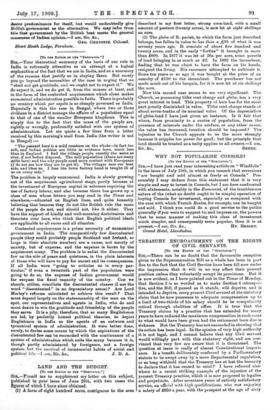[To TAR EDITOR Or THR SPROTATOR."/ Sta,—Yeur theoretical summary of
the basis of our rule in India is extremely attractive as an attempt at a logical explanation of the fact that we are in India, and ea a summary of the reasons that justify us in staying there. But surely you go beyond the necessities of the ease in urging that we " shall not get gratitude, and we ought not to expect it." We do expect it, and we do get it, from the masses at least, and in the form of the contented acquiescence which alone makes economical administration possible in India. There is probably no' Couatry which per capita is so cheaply governed as India. nspeciany is this the case in Bengal, where two or three civiliang in a district manage the affairs of a population equal to that of one of the Smaller European kingdoms. This is simply due to the fact that the mass of the people are, rightly or wrongly, profoundly satisfied with our system of administration. Let me quote a few lines from a letter received by this morning's mail from India (the writer is not in Bengal) :—
" The peasant here is a mild creature on the whole—in fact too soft, and Indian politics are little in evidence here, much less than in England. I find the village people exactly the same as ever, if not better disposed. The mill population (there are many mills here) and the city people need more contact with Europeans (I do not see how they are to get it). The villager sees our best side, and likes us. I fear the town factory hand is taught ill of us on every side."
The problem is largely economical. India is slowly growing out of the acquiescent agricultural stage, partly because of the investment of European capital in schemes requiring the use of factory labour, and also because there has grown up a class of men whose letters you may read in the Times and elsewhere,—educated on English lines, and quite honestly believing that because they do not like British rule the mass of the people do not, and should not, like it either. They have the support of kindly and well-meaning doctrinaires and theorists over here, who think that English political ideals are applicable to all races and all climates.
Contented acquiescence is a prime necessity of economical government in India. The oomparatively few discontented people (they could probably people Scotland and Ireland, so large is their absolute number) are a cause, not merely of anxiety, but of expense, and the expense is borne by the acquiescent many. The problem is to enlist the discontented few on the side of peace and quietness, in the plain interests of those who will have to pay for unrest and its consequences. If all India were "going to criticise us in every par- ticular," if even a twentieth part of the population were going to do so, the expense of Indian government would far surpass the fiscal capacity of the country. Can we absorb, utilise, conciliate the discontented classes (I use the word "discontented" in no depreciatory sense) ? Are Lord Morley's reforms calculated to achieve this result ? That must depend largely on the statesmanship of the men on the apt, our representatives and agents in India, who do and must .desire to win the gratitude and friendghip of the people they serve. It is a pity, therefore, that so many Englishmen are led, by perfectly honest political theories, to depict Englishmen in India as the agents of an outworn and tyrannical system of administration. It were better done, surely, to devise some means by which the aspirations of the discontented few can be reconciled with the continuance of a system of administration which suits the many because it is, though partly administered by foreigners, not a foreign system, but the survival of immemorial habits of social and








































 Previous page
Previous page